#dagor-nuin-giliath
Explore tagged Tumblr posts
Text
Okay, this is really nitpicky, but I have to say it. When the Fëanoreans landed in Middle-earth, Celegorm did not lead an army south and relieve the siege of the Falathrim. I’m seen that referenced or mentions in a lot of meta and fics, but it never happened. And there is no indication that Celegorm even met Círdan or any of his people, or was even aware of them prior to Fingolfin’s forces arriving.
What happened was that Morgoth reacted to the Fëanorean forces’ arrival by pulling his army besieging the Falathrim away and sending it north towards Ard-galen. And then, when it was in the north, far from the Falas, attacking the Fëanoreans, Celegorm defeated that army.
Yes, this is minor, and yes, it’s beneficial to the Falathrim that the arrival of the Fëanoreans made Morgoth decide he needed that army more elsewhere, but there is no direct “showing up and rescuing them” moment, and none of the Fëanoreans are anywhere near the Falas during the Battle-under-Stars, and Celegorm has no more to do with the benefit to the Falathrim than anyone else does (though he gets the Fëanorean forces out of a tight spot) and this just seems to be a weirdly common fanon misconception?
Under the cold stars before the rising of the Moon the host of Fëanor went up the long Firth of Drengist that pierced the Echoing Hills of Ered Lómin, and passed thus from the shores into the great land of Hithlum; and they came at length to the long lake of Mithrim, and upon its northern shore made their encampment in the region that bore the same name. But the host of Morgoth, aroused by the tumult of Lammoth and the light of the burning at Losgar, came through the passes of the Ered Wethrin, the Mountains of Shadow, and assailed Fëanor on a sudden, before his camp was full-wrought or put into defence; and there on the grey fields of Mithrim was fought the Second Battle of the Wars of Beleriand. Dagor-nuin-Giliath it is named, the Battle-under-Stars, for the Moon had not yet risen; and it is renowned in song.
The Noldor, outnumbered and taken at unawares, were yet swiftly victorious; for the light of Aman was not yet dimmed in their eyes, and they were strong and swift, and deadly in anger, and their swords were long and terrible. The Orcs fled before them, and they were driven forth from Mithrim with great slaughter, and hunted over the Mountains of Shadow into the great plain of Ard-galen, that lay northward of Dorthonion. There [in Ard-galen] the armies of Morgoth that had passed south into the Vale of Sirion and beleagured [EDIT] Círdan in the Havens of the Falas came up to their aid, and were caught in their ruin. For Celegorm, Fëanor’s son, having news of them, waylaid them with a part of the Elven-host, and coming down out of the hills near Eithel Sirion drove them into the Fen of Serech.
If you will indulge my very bad edit of the Beleriand map:
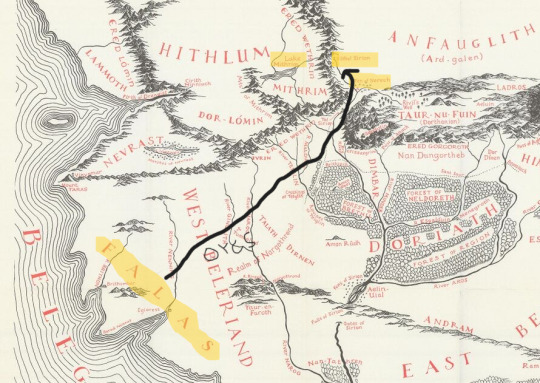
The orcs coming from across Ard-galen from Angband cross the mountains and attack the Fëanoreans up at Mithrim, in the top. The Fëanoreans drive them back over the mountains into Ard-galen. The orcs that were besieging the Falas, brought up as reinforcements for the other orcs, come up all the way into Ard-galen. Celegorm, attacking from Eithel Sirion (which is north of the Fen of Serech), drives them south into the Fen.
At no point in this are the Fëanoreans - Celegorm or other - anywhere near the Falas. Celegorm's actions have no more impact on the Falas specifically than anyone else's.
140 notes
·
View notes
Text
The amount of times I've seen the Dagor-nuin-Giliath misconstrued as a defeat, or "first sign" of the inevitable failure for the Fëanorians is just baffling if you consider the actual events.
But the host of Morgoth, aroused by the tumult of Lammoth and the light of the burning at Losgar, came through the passes of Ered Wethrin, the Mountains of Shadow, and assailed Fëanor on a sudden, before his camp was full-wrought or put in defence; and there on the grey fields of Mithrim was fought the Second Battle in the Wars of Beleriand. Dagor-nuin-Giliath it is named, the Battle-under-Stars, for the Moon had not yet risen; and it is renowned in song. The Noldor, outnumbered and taken at unawares, were yet swiftly victorious; for the light of Aman was not yet dimmed in their eyes, and they were strong and swift, and deadly in anger, and their swords were long and terrible. The Orcs fled before them, and they were driven forth from Mithrim with great slaughter, and hunted over the Mountains of Shadow into the great plain of Ard-galen, that lay northward of Dorthonion. There the armies of Morgoth that had passed south into the Vale of Sirion and beleaguered Círdan in the Havens of the Falas came up to their aid, and were caught in their ruin. For Celegorm, Fëanor’s son, having news of them, waylaid them with a part of the Elven-host, and coming down upon them out of the hills near Eithel Sirion drove them into the Fen of Serech. Evil indeed were the tidings that came at last to Angband, and Morgoth was dismayed. Ten days that battle lasted, and from it returned of all the hosts that he had prepared for the conquest of Beleriand no more than a handful of leaves.
-The Silmarillion, Chapter 13: OF THE RETURN OF THE NOLDOR
The Battle was a victory, not only barely eeked out but an utter eradication of Morgoth's armies. Not only the forces specifically marshalled against the arriving Noldor (what seems to be a reconstructed eastern host, with the last one mostly destroyed in the First Battle) but also Morgoth's initial western host occupied besieging Círdan and people, that had to be diverted for attempted reinforcement. Which the Fëanorians quickly shatter without issue, despite having to divide their forces. Something important for me to bring up because you'll often see the argument that the Fëanorians doomed themselves by cutting of the Nolo-and Arafinwëan manpower, which both ignores how Nolofinwë at the time was actively disputing Fëanor's leadership and therefore would not necessarily have led to an effective united front (with the implied 'solution' mostly boiling down to "Fëanor should have let Nolofinwë usurp his kingship because he would have made a better king anyway" and never "maybe Nolofinwë should have stopped agitating against the guy who was rightful king by all procedures of inheritance we ever see (and Fingolfin himself would adopt) to get himself crowned as his first priority"), as well as how even just the Fëanorians alone completely curbstomped the forces of Morgoth that had previously scattered the Laiquendi, confined Thingol to Doriath and besieged Cirdan. Sure, eventually they would have likely been overwhelmed by the unending stream of new armies, but that's exactly the same thing that eventually happens in canon anyway, even with the rest of the exiles present. Trying to argue that the Dagor-nuin-Giliath in particular already demonstrates the certainty of the Noldor's defeat is nonsensical.
It was "renown in song"! And given that this is mentioned in context of the victory it was, it feels safe to say the renown in question was of celebratory nature (as opposed to the often celebrated Fingolfin duel, which in-universe is explicitly described as thus: "The Orcs made no boast of that duel at the gate; neither do the Elves sing of it, for their sorrow is too deep."). Given how sparse the details and hints we get towards the Fëanorians and east Beleriand side of things can be, the vast majority of it in implications or one-liners (such as most of their alliances and friendships) and after-the fact admissions ("bereft of their power and glory of old" being the most prominent one that comes to mind), this just makes me very happy. Also disappointed-but-not-surprised how often it goes ignored or straight-up inverted. No doubt in large part due to the following:
Thus it was that he [Fëanor] drew far ahead of the van of his host; and seeing this the servants of Morgoth turned to bay, and there issued from Angband Balrogs to aid them. There upon the confines of Dor Daedeloth, the land of Morgoth, Fëanor was surrounded, with few friends about him. Long he fought on, and undismayed, though he was wrapped in fire and wounded with many wounds; but at the last he was smitten to the ground by Gothmog, Lord of Balrogs, whom Ecthelion after slew in Gondolin. There he would have perished, had not his sons in that moment come up with force to his aid; and the Balrogs left him, and departed to Angband.
First up, any and all attempts to try and paint this as a pathetic end are straight-up ludicrous (especially for people who are impressed by Fingolfin's duel with Morgoth later on). Fëanor in this is not only taking on a variety of Balrogs but also what seems like the remnants of the eastern host that his forces had hunted into Ard-Galen in the previous section (once they notice his separation from his army they turn from flight back towards him; the Balrogs are even specifically noted to "aid" them!). And he's doing it. By. Himself. Not only that, putting up a long and fierce resistance against multiple Balrogs (compare this to Fingon in the Nirnaeth, who gets quickly tripped up by two of them).
The Balrogs are always depicted as Morgoths elite troops, their last appearance in the story having been to drive off the empowered Ungoliant:
But Ungoliant had grown great, and he less by the power that had gone out of him; and she rose against him, and her cloud closed about him, and she enmeshed him in a web of clinging thongs to strangle him. Then Morgoth sent forth a terrible cry, that echoed in the mountains. [...] The cry of Morgoth in that hour was the greatest and most dreadful that was ever heard in the northern world; the mountains shook, and the earth trembled, and rocks were riven asunder. Deep in forgotten places that cry was heard. Far beneath the ruined halls of Angband, in vaults to which the Valar in the haste of their assault had not descended, Balrogs lurked still, awaiting ever the return of their Lord; and now swiftly they arose, and passing over Hithlum they came to Lammoth as a tempest of fire. With their whips of flame they smote asunder the webs of Ungoliant, and she quailed, and turned to flight, belching black vapours to cover her[...]. -The Silmarillion, Chapter 9: OF THE FLIGHT OF THE NOLDOR
(Though I'll grant that there might have been less Balrogs present in the battle against Fëanor)
I'll also point out that the Balrogs retreat the moment the rest of the Fëanorian host and sons arrive as reinforcement, indicating they were not confident in their chances to take them on (otherwise why not take this chance to destroy your enemies once and for all, before they can properly encamp and establish themselves?), which seems reasonably, given the extended struggle even Fëanor alone put up against them (to the point that despite drawing "far ahead" of his van, said van caught up in time to prevent the last of it).
So, obviously the death of their father and king still would have been a heavy blow, far be it from me to deny this (despite the stories refusal to give us any details on the emotional impact of it...), but I reject the notion that it turned the battle into a net "loss", especially if you keep in mind the unusual circumstances of it that are already kind of separated from the battle proper. Which leads into my last point, no longer about the battle itself but still relevant:
Then his sons raised up their father and bore him back towards Mithrim. But as they drew near to Eithel Sirion and were upon the upward path to the pass over the mountains, Fëanor bade them halt; for his wounds were mortal, and he knew that his hour was come. And looking out from the slopes of Ered Wethrin with his last sight he beheld far off the peaks of Thangorodrim, mightiest of the towers of Middle-earth, and knew with the foreknowledge of death that no power of the Noldor would ever overthrow them; but he cursed the name of Morgoth thrice, and laid it upon his sons to hold to their oath, and to avenge their father. -The Silmarillion, Chapter 13: OF THE RETURN OF THE NOLDOR
Even if you are a fervent believer in the fact that Fëanor truly had a clear revelation about the future somehow (at the very least in part because you prefer the omniscient narrator to the in-universe chroniclers, I presume), even if you believe he, dying, would have known this epiphany for what it was: in-universe this would have been ludicrous to assume and incongruent with the very recent lived experience of him and his people. The Fëanorians, it bears repeating, just won a crushing victory against Morgoths forces, which they near obliterated, and even his most elite soldiers fled before them, the only notable casualty occuring due to singular circumstances (which fandom is not slow to point out when it comes to more humoristic purposes). There is literally NO rational reason for the Fëanorians, and indeed, Fëanor himself, to see their cause as doomed based on their experiences with Morgoth and his forces! So even if Fëanor truly gained this "foreknowledge", why should he have heeded it? The guy laughted in the face and threats of his worlds angels! These characters do not know they are in a story about fate and doom without recurse from either, and are determined to fight against such forces whenever they are presented or threatened with them. So the argument I see that uses this as another ammunition why "Fëanor sucked and was a bad dad!" (his sons are literally men grown...) because he urged his sons to remain committed to a cause he "knew was doomed" just ignores everything about recent events and the Fëanorian mindset and determination.
Since it's one of my greatest gripes, I also have to once again ask: where, in this, do people see this infamous "second oath" (which...wouldn't that make Celegorm's recital of it in Nargothrond a "Third Oath"? Yet I've never seen that argument, funny that) ?
(I also disagree with the occasional choice to present Maedhros' capture as somehow still part of it, which it very much is not, however close to the battle's conclusion it might have happened, since the concession of defeat by Morgoth's embassy necessitates for that battle to be regarded as concluded by both parties imo. I'd also argue that the Fëanorians took some time to recover from the ten day battle and fresh grief of loosing their father, as well as time to debate the offer for a few days at the least, something which Maedhros needing to convince his brothers of his idea kind of implies, nevermind the other practicalities of it, such as agreeing upon the place for negotiations and numbers of troops allowed (which both sides break, but would still have been negotiated) with Morgoth's embassy, which would have taken additional time. Which is not even mentioning Maedhros potential coronation. But that's neither here nor there...)
62 notes
·
View notes
Text
Was Feanor's Death Anticlimactic?
(thank you to @ckgoksoy's artwork and @nyarnamaitar's tags on it that inspired this)
I’m sure the fandom has seen this idea floating around, that his death was quite anticlimactic*, a letdown after all his hype and drama, so I won't elaborate on this common opinion, one that I initially shared. I instead want to challenge it. Furthermore, I posit that not only was his death not anticlimactic, but that it was one of the most glorious fights in the whole legendarium. *(I'm speaking of the whole scene in general that ended in his death, not the outcome of it - let's be real, self-combustion isn't boring and that epic circumstance was unique to Feanor alone)
Buckle up.
I'm not going to dive into "narrative bias" - it's a touchy subject and a deep discussion in itself - but it does need to be acknowledged here however briefly because it's so glaringly obvious that it directly impacts how we the Reader interpret Feanor's final fight scene.
My belief of the problem is not that there wasn't anything significant to report about Feanor's fight with the Balrogs, but that it was deliberately withheld from us. Let's look at Feanor and Fingolfin, two incredibly imperative characters to the drama. Compare the scene of Feanor's fight to Fingolfin's duel with Morgoth. In the silmarillion, from the moment he elected to go forth to the conclusion of his death, Feanor gets 1.5 paragraphs containing 344 words. Fingolfin using the same window gets 6 paragraphs containing 766 words. Of those 766 words, for text dedicated specifically to the actual combat alone, Fingolfin got 261 words.
Feanor got 29.
That's quite a gaping difference, especially when it's between these two. But you might make the argument that these two combats had entirely different foes. Feanor faced Balrogs, but Fingolfin fought Morgoth, the Enemy, the only occasion in which Morgoth emerged to fight anyone, so of course it should shine in the spotlight with some detail as to how it went (and yes, it should). It has nothing to do with bias against who was fighting, but what they were fighting.
All right. I'll pretend that this distinction is important. Let's turn to the other recorded Balrog-fights. Again, not including all the narrative revolving around their fight & subsequent death, but specific to the combat alone:
Fingon got 94 words Ecthelion got 144 words Glorfindel got a whopping 210 words
Feanor got 29. Now, length is not the deciding factor in this, obviously. The content contained within is what matters, and that's the rub: there's content. Which is why I literally figured out the word-count dedicated to what happened within the timeframe of the combats. Length is not important, but the point I'm trying to make with highlighting the lengths is that some measure of detail of the combat was included for ALL the other deaths-by-Balrog. Except Feanor's. So the argument that it was because of what Feanor was fighting that we were left with a truncated account is moot.
And remember, the three other Elves above were each fighting a single Balrog whereas Feanor was up against many. And I'm to seriously believe that there was nothing noteworthy to write about that? This was Feanor. Because that's another thing. The other three accounts were of minor characters (and Ecthelion and Glorfindel were very minor characters compared to Feanor). This was the legendary Feanor, the greatest of Elves to ever live, larger than life, powerful, intelligent and skilled beyond measure, and without who's driving force we wouldn't have had a story...and a few dozen words only are dedicated to his demise?
Now to clarify, Glorfindel's and Ecthelion's fights weren't included in the silm. Like I said, minor characters, so it wasn't surprising their combats were cut from the final draft. Their word-count was pulled from their accounts in The Fall of Gondolin. So, to be fair, I took the (really long) time and looked up Feanor's death in every. single. book. and, much to my genuine surprise, the silmarillion had the longest and most detailed account. The measly 29 words. What were those words? I should probably include them at some point since I'm going on about it:
"Long he fought on, and undismayed, though he was wrapped in fire and wounded with many wounds; but at the last he was smitten to the ground by Gothmog"
That's it. No wonder people are underwhelmed when reading it. So vague and containing absolutely nothing specific after he was surrounded. And it says "long he fought on", which means this fight was no short thing. This is an interesting element, because even Glorfindel's fight, which was given the most detail, was described as a fast event: "Now there was a deadly combat upon that high rock above the folk [...] yet it was over ere Glorfindel's men could leap to his side." Long he fought on. Logic dictates that Feanor's fight therefore would have the most to report of what occurred therein, but all we get is "wounded with many wounds" and "wrapped in fire"? (though that's an awesome visual to imagine, I have to say)
Am I really supposed to believe that every Balrog-fight was interesting enough to spend time writing about it except Feanor's? Especially when he faced not just one Balrog but many? And not one at a time, but all at once? (because it says he was "surrounded") And when this combat lasted a long time? All of these factors tied together hint at something awesome that happened, and you want me to believe it wasn't a jaw-dropping showdown?
This history was written by Pengolodh who, with reason, had a very negative outlook towards Feanor and, while he was a brilliant historian, he wasn't wholly objective and one way I believe this manifests is, in fact, in his lack of documentation of this fight. I'm only highlighting this factor and not the narrative he penned about the people he was writing because, especially comparing Feanor's and Fingolfin's accounts, that becomes very problematic and is a separate post entirely.
Feanor only got 29 words for his combat. I'll even be generous and say it was 35 words if we include the preceding line where it explains that Feanor was surrounded by them. What would happen if we rewrote Fingolfin's 261-worded duel with Morgoth and condensed it down to something short and sweet? Something like this:
"Fiercely he fought in rage and grief, and with Ringil he hewed at the Black Foe ere Morgoth crushed him to the ground. Thus died Fingolfin before Angband's gates."
Kind of anticlimactic, isn't it? (and yeah, I made that 29 words)
What an astounding difference detail makes for the conclusions we draw about these two fights. Now, if Feanor had died straightaway at the start of the fight, then yeah. Deeming it anticlimactic would carry a lot more weight.
Except he didn't.
Which brings me to my next three points. Because now after harping about the egregious lack of information, how can I dare suggest then that his combat with the Balrogs was glorious?
Ignore everything I've said up to this point. Dismissing the narrative bias completely, if I were of the opinion that it doesn't exist or its impact on the text is nowhere near as substantial as I've implied, the minimal detail of Feanor's death scene itself still convinces me that this scene was epic.
And yes, I do believe Feanor's fight was in fact glorious.
1: the Balrogs weren't able to kill him immediately
Those four words, "long he fought on" cannot be overstated. Fights with Balrogs in the First Age were fast, if you managed to live long enough to actually fight them, that is. And if you did, it was shortlived. Not Feanor's though. He was wounded with many wounds (so creative, Pengolodh), but he was never dealt the killing blow (I'll come back to this). The final wound Feanor received put him to the ground. Maybe Gothmog swept his feet out from under him with the fiery whip. Maybe this wound was to his thigh and caused him to fall to his knees. Maybe it took four of them converging on him with attacks for Gothmog to finally slip in. WE'LL NEVER KNOW. But he's on the ground and he's still alive. Still alive when his sons and army arrived to help and still alive when the Balrogs left:
"Then his sons raised up their father and bore him back towards Mithrim. But as they drew near to Eithel Sirion and were upon the upward path to pass over the mountains, Feanor bade them halt; for his wounds were mortal and he knew that his hour was come."
And still alive while they carry him away. Feanor didn't die on the battleground of his Balrog-fight. He died here, near the slope of the mountains. It says earlier in Feanor's account that he pressed on, thinking perhaps that he could reach Morgoth himself, which means they were far into the fields of Ard-galen, far from the mountain pass. From Eithel Sirion to the skirt of Thangorodrim's mountains, Ard-galen stretched around 70 leagues wide (one map has it around 100 leagues). Let's be generous and say this fight occurred at the midpoint; 35 leagues. If it takes an hour to walk a league, that's still 35 hours of non-stop walking without rest-stops, sleep or being weighed down by supplies and an army to get back to Eithel Sirion where Feanor died (some accounts have him being borne all the way back to Mithrim before he died).
At minimum, Feanor didn't die until at least a whole day later. He needed assistance getting up from the ground and moving, but he was very much alive, still talking, still coherent. Can you imagine how awful that was for his sons? The adrenaline of running as fast as they could to help him, the overwhelming relief that he was still alive, badly hurt but alive, they tend to his wounds as best as they can and get him out of there, probably smiling at their father being irritated by the outcome of the fight because that sounds like him, he's normal haha he'll be fine...But he's only getting worse with each league, face paler, can't move at all on his own, becoming so quiet. They keep tending to his wounds, try to keep him hydrated, steadily get terrified at how he gets weaker and weaker, and then he tells them to halt. The fact that he survived for a time, for many hours, led me to believe that whatever fatal wound he got, it caused severe internal bleeding, because his sons had plenty of time to patch him up and Elves' bodies are resilient and heal fast, but this wound was unstoppable.
Feanor fought against multiple Balrogs, and they couldn't kill him. He fought multiple Balrogs all at once, and they couldn't kill him. He fought multiple Balrogs all at once for a long time, and they couldn't kill him, one and done. He walked away from it, if for a short while, and that's amazing.
2: the Balrogs fled the scene
How has the fandom not lost their collective minds over this tidbit? Feanor gets struck down by Gothmog. He's on the ground, exposed, and it says he would have perished right then and there if his sons hadn't arrived to help. Feanor's vulnerable on the ground, unable to defend himself. Gothmog had to only strike him one more time and done, mission accomplished (he could've just stomped on him, just saying). Gothmog probably moved to do so, but didn't. Let me ask you a question:
What the hell did Feanor do in that fight to make the Balrogs AFRAID?
This was one Elf, a single Elf that they were all piling on, they finally get him to the ground...and they run. They can finally kill him, but at the mere SIGHT of his seven sons, the children of this one Elf running full pelt towards them enraged and desperate, they elected to flee instead of taking the two seconds to finish the job. I can see it; Gothmog's eyes blazing down at this prone Elf, raising his weapon for the killing blow, hears yelling, looks up, sees these Elves coming, takes a second to consider and then nopes out of there.
What in the world did Feanor do to them during their fight to make the Balrogs believe that fleeing from these coming Elves was the better option? They're Balrogs! Monsters, demons of living fire, the greatest of Morgoth's servants...and they run at the sight of Feanor's sons and the people with them. See now why I'm so desperate for details of that fight? Feanor put fear into them. There was really nothing worth writing about?
3: Morgoth was desperate
"[...] Morgoth was dismayed. Ten days that battle lasted, and from it returned of all the hosts that he had prepared for the conquest of Beleriand no more than a handful of leaves."
Morgoth was dismayed. Can we not appreciate the magnitude of this simple sentence? Appalled, apprehensive, frightened, nervous, shocked - Feanor and the Noldor made Morgoth, mightiest of all beings, dismayed.
This was a landslide victory for the Noldor, and it's often forgotten because of Feanor's death in the hour of that victory. The size of Morgoth's army here can't be disregarded. This wasn't a troop or two he sent to kill the Noldor, this wasn't a regiment sent to take over Mithrim. This army was of such a gargantuan size that Morgoth intended to use it for "the conquest of Beleriand". Not just the Falas or Doriath, the entire continent. It was THE army, that's how huge it was. And the Noldor massacred them to such a degree that "no more than a handful of leaves" returned to Angband.
And that puny remnant was running for Angband as fast as they could, because these terrifying Elves were hot on their tail, Feanor at the lead. And he runs faster, pulling ahead. (the Elves are hot with victory, how did Feanor manage to outrun them by such a distance? dang dude) He's coming for them. For Angband, for Morgoth, his father's slayer and thief of his treasure. Vengeance is nigh.
And from afar Morgoth sees Feanor coming. For him. His army is destroyed, gone, and Feanor, blazing like the Spirit of Fire he is, is charging for his fortress with the army of Noldor in his wake. And I absolutely love that Morgoth's solution to this wasn't to send one Balrog but several of them, including his General. That's what he deemed was necessary to stop Feanor. The Balrogs probably went out thinking "kill that one Elf? Easy, no problem", until they started fighting him...and struggled to do it.
It's interesting because Feanor wouldn't have been able to breach the walls of Angband. Not even the Valar could, and Morgoth knew this. He knew Feanor wouldn't stand a chance if he actually reached Thangorodrim. But such was his dismay that in his fear and anxiety, that fact no longer registered to him. He reacted instead, and his reaction is so telling. The Balrogs were a last resort, a desperate attempt to get these Elves to stop.
And it worked.
Thus why I say that details of his fight were deliberately withheld from us instead of the idea that they weren't worth reporting. The question, then, is why? Why withhold it? Feanor's death scene was never anticlimactic. It was instead given such a disservice in the tomes of history, for the historians simply neglected to report anything about it (for the sole purpose of making it seem unnotable perhaps?). This fight was badass. And side note: "wrapped in fire"? There's no sun or moon yet, guys, and that close to Angband I'm willing to bet even the stars were veiled by Morgoth's gales. It's pitch black on the Ard-galen except for what light the Elves carry...Try to envision what his sons saw as they were running to him, in the distance, the whirling inferno Feanor was engulfed in, that lit up the entire fields up to the skies. (Were they confused at first? Thinking it was simply a manifestation of their father's fire until they saw dark shapes moving in it?)
How could anyone omit information about such a marvelous event? Feanor died very early on, but he made sure his final stand was so glorious as to put fear into the Enemy. Think about it; this day was the first time Morgoth learned to dread the Elves.
29 words. Why oh why did you withhold everything else? Yes, all these factors woven together coalesce into an incredible impression of what transpired, but it's remanded unto our mere imaginations to guess and envision. I'm fully convinced Feanor's fight with the Balrogs was jaw-dropping, and I'm resigned to being forever embittered that we were given a lousy account of that event. There is one thing, though, that pacifies me and with it, I'll make my conclusion to this long meta. Why was it withheld? There's one detail written about this battle in The Quenta that I think provides the answer:
"no tale can tell the valour of Feanor"
Perhaps I'm being too harsh on Pengolodh for his lackluster description of Feanor's last fight. Maybe it was less of a passive-aggressive hostility towards Feanor...and more so the simple fact that no amount of words would've ever done it justice.
#feanor#silmarillion#dagor nuin giliath#morgoth#balrogs#gothmog#feanorians#ard-galen#pengolodh#meta#narrative bias#unreliable narrators
97 notes
·
View notes
Text

Feanor Against the Lord of Balrogs - by Evolvana
During the The Dagor-nuin-Giliath (the Battle-under-stars)Fëanor encountered Gothmog, Lord of the Balrogs, in a deadly fight. Gothmog came out victorious, and was known to wield a great black axe, feared by his enemies.
They come of course from the Silmarillion, by Tolkien.
#balrog#tolkien legendarium#jrr tolkien#the silmarillion#gothmog#feanor#the battle under the stars#dagor nuin giliath
15 notes
·
View notes
Text

@shrikeseams
Fingon, literally dying: Oh, this is what he meant. This is unpleasant, I wouldn't want this either.
(Do you ever think about how Fingon and Maedhros both died in flames? Because I do.)
Maedhros gets a good told-you-so moment at the Bragollach because everyone told him it was too cold in Himring to burn. But look! Dragons! Maedhros was right, as always, because Maedhros always expects the worst and so is never disappointed. (Except for once.)
The other reason there's no tapestries is that Maedhros refuses to do any of his craft except when absolutely necessary, even though he could do it (or at least most of it) one-handed, because he's too sad and too focused on vengeance, and can't bear to do his craft like that.
Maedhros, a weaver, refusing to put up any tapestries in Himring even though that would be more practical, claiming that it's because tapestries burn too easily and would be a hazard.
#that's true of most of the feanorians post-dagor nuin giliath#(those who didn't already stop their craft post-alqualonde)#but for maedhros especially so after thangorodrim#he just. he can't. he's tried and he can't.#maedhros
91 notes
·
View notes
Text
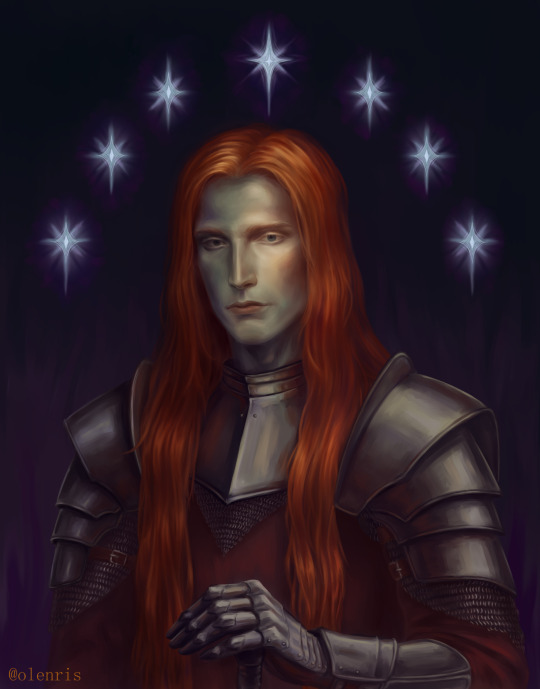
Maedhros
The oldest of Fëanor's sons before the Dagor-nuin-Giliath
#maedhros#silmarillion#tolkien#elf#digital art#art#feanorians#maitimo#nelyafinwe#portrait#sons of feanor
205 notes
·
View notes
Text
What if Morgoth's parlay was a different sort of trap?
He sends the message, dangling the promise of the Silmarils, and of course Maedhros agrees to go. Of course he brings more than the agreed upon amount of force, forbids any of his brothers from riding with him. It's a trap, obviously, but he won't drag them into death with him.
But Morgoth is counting on that. Because that means Maedhros is bringing the best of his soldiers. That everyone who stayed behind - Maedhros' brothers, those who might have been injured from the Dagor-nuin-Giliath and could no longer fight - will be thinking about their king. They will be distracted. Less defended. Vulnerable.
And then...
Maedhros arrives at the parlay meeting grounds and waits. And waits. Morgoth does not come. A coward, Maedhros thinks, and he rides back with his soldiers to his camp.
They see the smoke first. Maedhros' heart turns cold.
Too late, Morgoth's true intentions become clear. It was a trap, but Maedhros did not spare his little brothers by not letting them come with him. He looks at the devastation the Enemy has left behind and screams.
(later, his followers will say that he looked like Feanor. That his eyes burned with a dark fire, a horribly familiar mix of grief and madness)
In Angband, Morgoth forces the six sons of Feanor to kneel before his throne and laughs.
#file it under 'oh god why do i have so many WIP ideas'#'when will I be free from them please have mercy'#my writing#silmarillion#maedhros#morgoth
250 notes
·
View notes
Text
#jrr tolkien#lotr books#tolkien legendarium#the silmarillion#caranthir#house of feanor#silm polls#silm headcanons#silm elves#the history of middle earth#morifinwe#carnistir#morifinwë#feanorions#sons of feanor#feanorians#tolkien headcanons#tolkien polls#valinor#noldor#first age#beleriand#nirnaeth arnoediad#second kinslaying#third kinslaying#middle earth#first kinslaying#alqualonde#uinen#sons of fëanor
26 notes
·
View notes
Text

Soo here is some older piece I did with Photoshop and a Wacom Bamboo tablet! Feanor is one of my favourite characters from Tolkien-Universe. His name fits so well with his kinda fiery temper and I imagined him surrounded by -of course- fire. I think I am really into wild personalities. Thought of him fighting the second major battle of the War of the Jewels in Beleriand, the Dagor-nuin-Giliath (or the Battle Under the Stars).
->The pose was a reference from Pinterest! Thanks to the artist, but sadly he wasn't mentioned and I can't find the artwork anymore.
#tolkien#middle earth#silmarillion#fanart#lotr fanart#lord of the rings#feanor#feanor fanart#feanor did nothing wrong#tolkien elves#the silm fandom#silm elves#the elvenking#elvenking#noldor#noldor elves#tolkien fanart
264 notes
·
View notes
Text

Legendarium by Pete Amachree
Oromë leading his forces during The War of Wrath
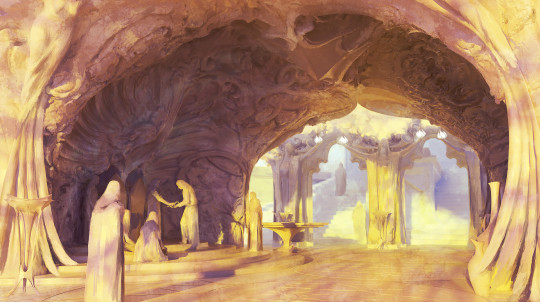
Beleg is presented with the sword, Anglachel
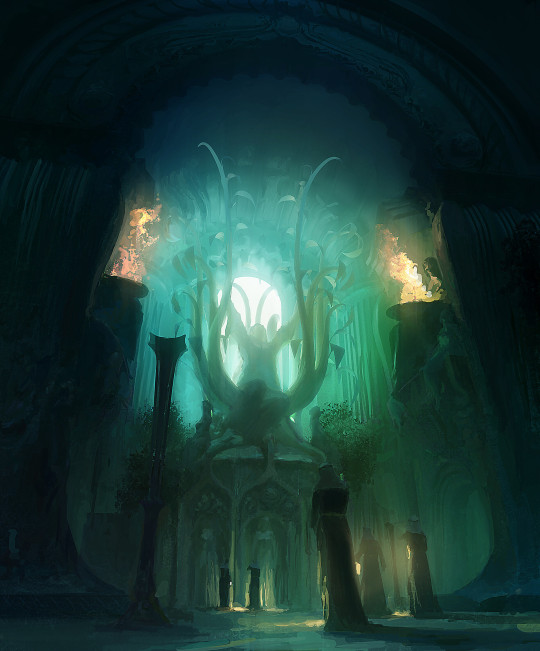
Númenórean shrine to Yavanna, before the arrival of Sauron
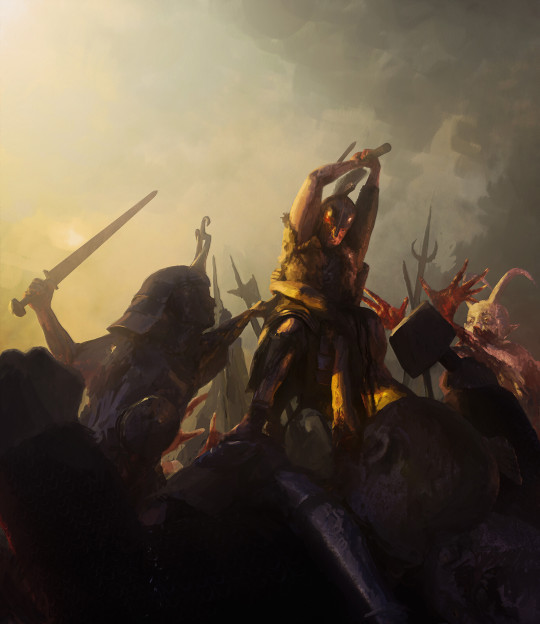
Húrin's last stand at Nírnaeth Arnoediad
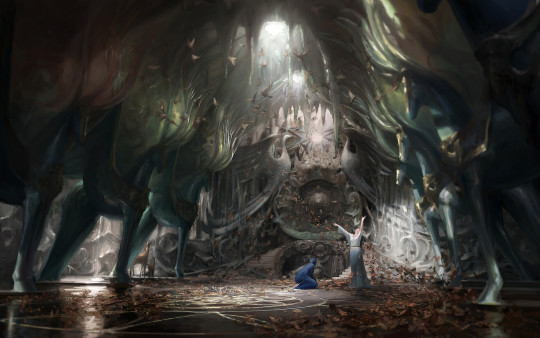
Melian the Maia and her daughter Lúthien, in the throne room of Menegroth
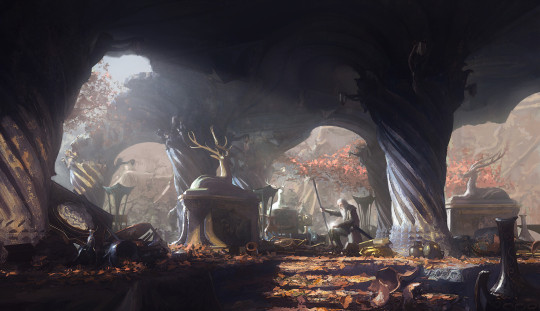
Húrin finds the Nauglamír, in the ruins of Nargothrond
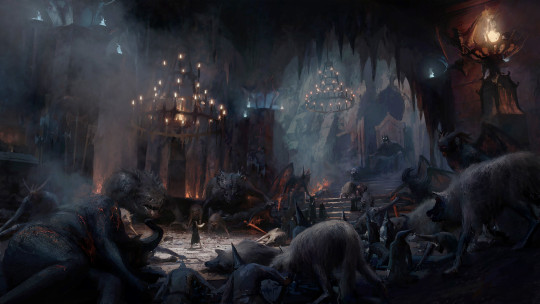
Luthien sends the court of Morgoth to sleep with a song of enchantment

Fingolfin challenges Morgoth at the Gates of Angband
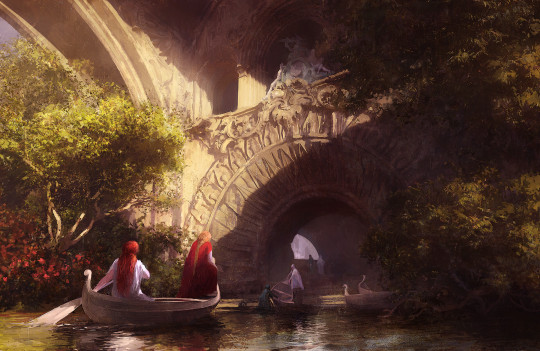
City of the Gondolindrim
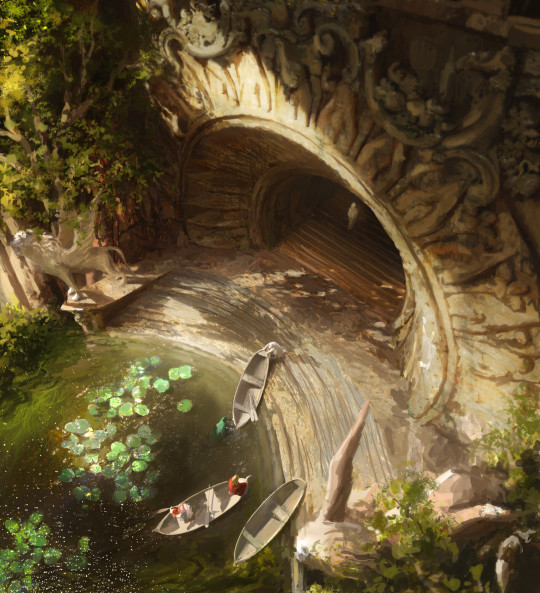
Gondolin: The House of the Golden Flower
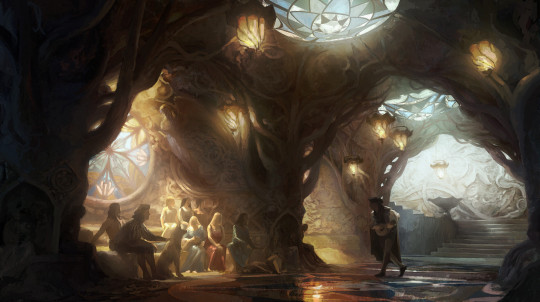
Daeron at the court of Menegroth
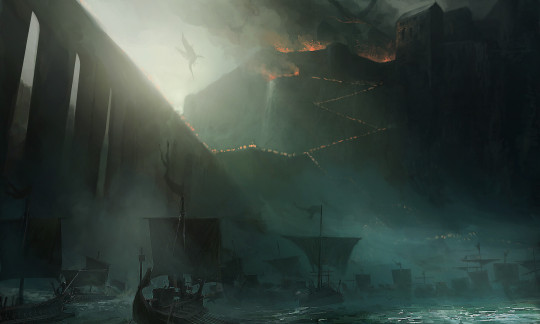
Assault on Nargothrond
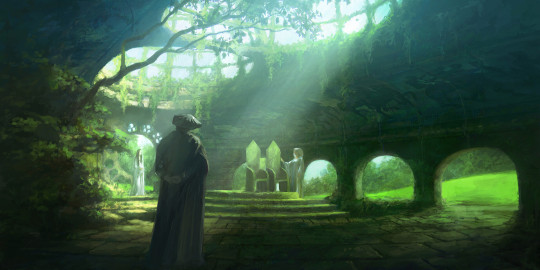
Ruins of Doriath
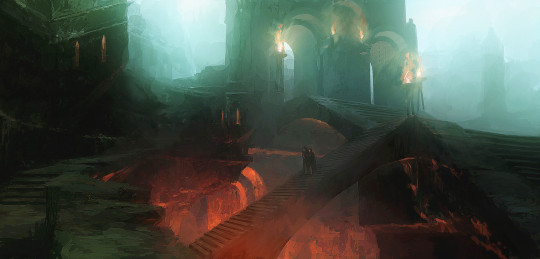
Beren and Luthien flee Angband
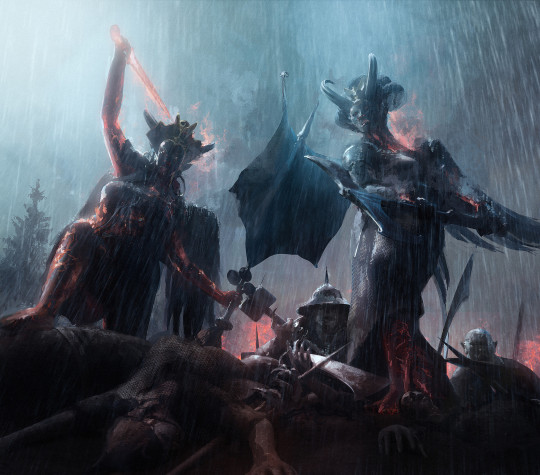
Two Valaraukar, or Balrogs at Nírnaeth Arnoediad

Húrin returns to Morwen
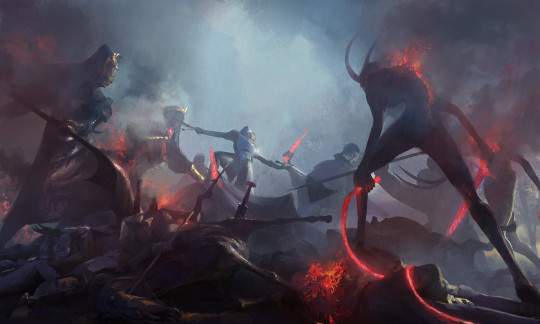
Fëanor's last stand at Dagor-nuin-Giliath

The Catacombs of Menegroth
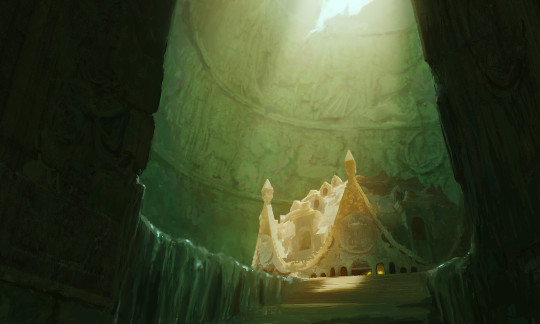
The Halls of Mandos
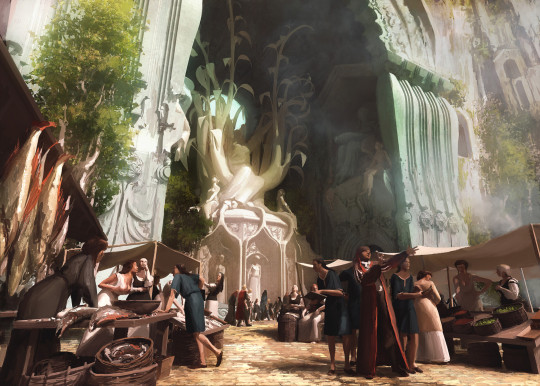
Númenórean shrine to Yavanna Kementari

Melkor and Sauron
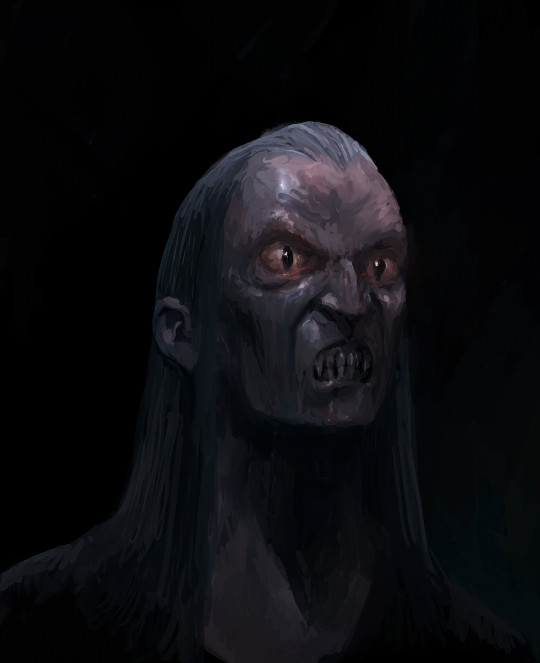
#tolkien#jrrt#jrrtolkien#jrr tolkien#silmariilion#the silmarillion#valar#valinor#orome#yavanna#beleg#valier#anglachel#numenor#sauron#the lord of the rings#lord of the rings#lotr#melkor#elves#hurin#melian#luthien#beren#balrogs#the hobbit#hobbit#fingolfin#angband#morwen
377 notes
·
View notes
Note
I wish you would write a fic that provides more backstory on Annael.
OR
More of your marvelous Feanorions! What happened to Curvo's firecracker of a wife?
❤️
@sallysavestheday || I wish you would write a fic... || accepting
You know, now that you mention it, I've never actually written anything from Annael's POV! He's not as fully developed in my mind as some of the other characters I write about, but the general backstory I've imagined is that he's been the leader of the people of Mithrim for about a hundred years prior to the First Battle. After Thingol and his host had retreated behind the Girdle, but before Fëanor's host arrived and defeated Morgoth's forces in the Dagor-nuin-Giliath, he and his people were in a rather dire situation, because Morgoth's orcs had unfettered access to most of western Beleriand, apart from Doriath and the Falas (and the Falas itself was under siege).
When Fëanor and his followers arrived in Mithrim, after several long months of the Northern Sindar being assailed, welcoming the Noldor seemed like a logical idea. They were fellow Eldar and capable of battle, and maybe their leader was a bit intense, but when Morgoth's orcs came pouring over the Ered Wethrin in a surprise attack, the Noldor were indispensable in achieving victory in the resulting battle. And yes, Fëanor did get himself killed through a mix of rage and recklessness, and his heir did end up being captured by Morgoth, but more warriors are more warriors, and the second son took over and was competent enough.
This was, I think, the beginning of Annael's break with Thingol. He never renounced Thingol as his king, but the fact remained that Thingol had retreated behind the Girdle in the First Battle and left the people of Mithrim to fend for themselves, despite being their king. Between that and Thingol's known disdain for the Northern Sindar (as laid out in "The Problem of Ros" in The Peoples of Middle-earth, for those of you who are curious where that particular detail is coming from), Annael was feeling a bit bitter, and he and his people, I think understandably, judged the Noldor to be more reliable allies than Thingol and the Iathrim.
(Side note, but I think this bitterness toward Thingol was not uncommon among the Elves of Mithrim. Annael certainly passed it on to his daughters, and Ianneth in turn passed it on to Ereiniel, in whom it was reinforced by Doriath's refusal to join her father in assailing Angband, the battle in which Fingon was killed and in the aftermath of which the majority of the Elves of Mithrim -- Annael included -- either were slaughtered or were driven from their home. Sixteen years passed between the Nírnaeth Arnoediad and Annael's arrival to the settlement on Balar, and that was an agonizing length of time to not know what had become of him (and his wife and younger daughter) for both Ianneth and Ereiniel. I think, in the Second Age, some of what Oropher perceives as Noldorin arrogance in Gil-galad is actually an echo of the inherited anger of the Northern Sindar.)
The arrival of Fingolfin and his host did make the situation rather fragile, but Annael had enough experience leading his people that he was able to successfully take a neutral stance and maintain friendly ties with both groups, favoring neither one nor the other. Still, though Fingon's rescue of Maedhros was quite astounding, Annael and his people's prior experiences with escaped thralls left them deeply wary of Maedhros, and they were quite relieved when Maedhros ceded the crown to Fingolfin, who seemed an altogether wiser and more stable choice for the role.
Fingolfin's fortitude in leading his people across the Helcaraxë, too, left Annael feeling more inclined towards the Fingolfinians than the Fëanorians, as he felt that Fingolfin had proven himself to be made of similar stuff to the Northern Sindar, who had been living on Morgoth's doorstep under constant threat for hundreds of years. Fingolfin and his children had faced and overcome a long, dire hardship in a way that Fëanor and his sons had not, and Annael had no qualms about building a stronger alliance with him.
Little bit of a ficcish thing:
He says nothing to Fingolfin, nor to his son, but the truth is that the rescued prince -- the one the followers of Fëanor's sons in the settlement on the other side of the lake call king -- worries him. While he has offered the aid of his people's healers to assist Fingolfin's own in treating the man, as befits an ally, what neither Fingolfin nor Fëanor's sons know is that the healers sent have been selected not solely for their knowledge of illness and injury, but also for their ability to defend themselves. Mithrim's Elves have lost too many of their own in the past to the sudden violence of thralls who had escaped Angband with their bodies, but had not escaped Morgoth's control over their minds.
Still, he cannot deny that there have been some benefits to the prince's rescue. The tension between Fingolfin's people and the people of the Sons of Fëanor has dropped to a low simmer rather than the rolling boil it was three weeks ago, and Annael no longer feels that maintaining his people's peace with both camps is like walking a tightrope of spun cobwebs. If the Noldor can unite under one king, they'll be a stronger ally to his people, and his people are in need of allies. They have seen that they cannot rely on their own monarch.
But Annael will rest easier if the chosen king is Fingolfin.
#dash games#sallysavestheday#my fics#woman king AU#annael#ianneth#gil galad#feanor#fingolfin#thingol#mithrim#elves of mithrim#people of mithrim#northern sindar
18 notes
·
View notes
Text
#battle of pelennor fields#first kinslaying#battle of five armies#epic battles#tolkien tumblr#tolkien legendarium#tolkien#jrr tolkien#lord of the rings#silmarillion#the hobbit#lotr#fantasy#lotr poll#tolkien polls
86 notes
·
View notes
Text
Fëanor Lives AU
Inspired by comment-tags on my poll about whether Fëanor or his sons were worse, I’m going to try to theorize what would have happened if Fëanor hadn’t died within a few weeks[1] of landing in Beleriand.
First, there’s the question of whether, even if he had survived Dagor-nuin-Giliath, he would have survived until Fingolfin arrived. There’s a decent case to be made for no. His sons are fairly rudderless and inactive after he dies and Maedhros is captured, and don’t do a lot between that point and Fingolfin’s arrival; that would not have been the case if Fëanor had lived. (Setting aside the possibility of “he lives but is too severely injured to do anything,” just because it’s not what I’m interested in here.)
I don’t see him just sitting in Hithlum (even if Maedhros was captured, and I don’t see that happening either if Fëanor had lived; it feels like another product ofhis sons’ disorientation in the wake of his death). And considering his mindset from his speech in Tirion and Oath through to the point where he dies in canon, I can see him throwing his army against Angband until a large part of them are dead, and potentially until he himself is dead. Given that they successfully take out pretty well the entire orc-army in Dagor-nuin-Giliath (“Ten days that battle lasted, and from it returned of all the hosts that [Morgoth] had prepared for the conquest of Beleriand no more than a handful of leaves.”), they might have even made it into Angband. This isn’t Morgoth as of the Dagor Bragollach or Nirnaeth Arnoediad, when he’s got dragons and the accumulated armies of 400 years; at this point he’s got balrogs and Sauron and some other Maiar and a fortress and some kind of reserve forces. Morgoth may be best off retreating enough to lure them into into Angband, and then capturing or killing them when they’re in the dark, disoriented, separated, in mazelike tunnels.
So that’s one possibility: that by the time Fingolfin arrives, Fëanor and much of his forces are dead or captured. The ‘captured’ possibility lends itself to interesting AUs by itself.
In any possibility where Fëanor does survive until Fingolfin arrives, but has realized he can’t defeat Angband on his own, I feel like there’s an extremely high likelihood of another Kinslaying then and there. Not primarily because the elves who crossed the Helcaraxë are angry with him, though they certainly are, but because we’ve seen Fëanor in this position before: with a determined sense of what he wants to do, without the resources to do it, and with someone else denying him those resources. That was Alqualondë. Given the mindset Fëanor has displayed all through the Return, he would see it as Fingolfin’s usurpation standing between Fëanor and the forces he needs to conquer Angband (and would not recognize that the other elves’ total unwillingness to accept him as king is associated with him stranding them at the far end of an icy wasteland, more than with Fingolfin specifically, and that killing Fingolfin is not going to get them on-side). This battle would be fairly brutal, with a lot of bad blood on both sides; it would be very amusing to Morgoth, and pretty well put an end to any chance of an equivalent to the Siege of Angband ever coming to pass.
(I know there are plenty of fanfics where Fëanor survives and Fingolfin recognizes him as king. I just can’t see this happening; not only because of the very justified resentment, but because Fëanor’s decisions have been uniformly terrible, and not abandoning his people to that kind of terrible leadership was the main thing motivating Fingolfin to join in the Return at the start. In the extremely unlikely event that Fingolfin did, I don’t see most of the Noldor who crossed the Helcaraxë following him rather than breaking off under Turgon or someone. The reason why Maedhros’ abdication is so crucial in canon is because it’s the only thing that’s ever going to enable the Noldor to form a united front.)
So yeah, I have to agree with the people on the poll who said it’s probably for the best that Fëanor didn’t survive longer. What he would have done if he had been alive during the later parts of the Silm feels like a moot point because I can’t imagine a scenario where he survived but events were otherwise similar to canon. He’s a force of nature; he makes the narrative different, it’s what he does. It’s why him setting everything off and then suddenly dying makes for such a great story.
[1]: I’m making an educated guess.The Fëanoreans travel up the Firth of Drengist and into Hithlum, start setting up camp by Lake Mithrim, and are attacked by orcs before they can finish making camp; the battle against the orcs, Dagor-nuin-Giliath, lasts 10 days, and Fëanor diesat the end of it.
57 notes
·
View notes
Text
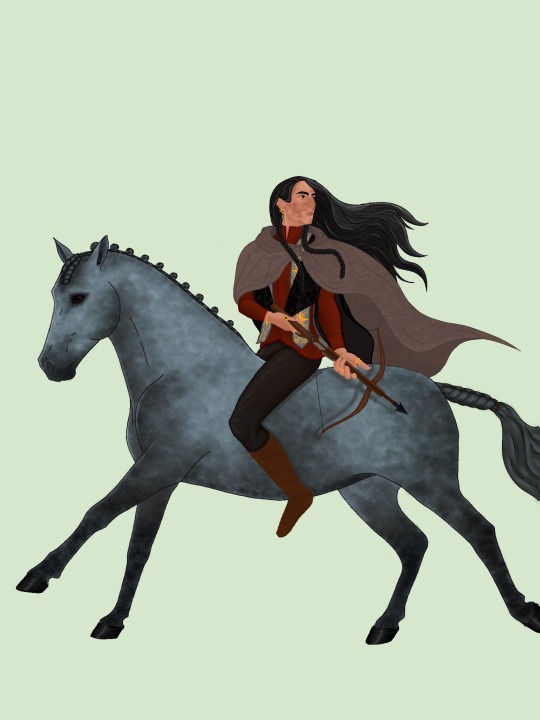
Caranthir riding through Dor Caranthir
Caranthir was born in Valinor to Fëanor and a Nerdanel, their fourth son. He swore the Oath of Fëanor and followed his father to Middle Earth, aiding in the first kinslaying and burning the ships at Losgar. After Dagor-Nuin-Giliath, Caranthir established his own realm in Thargelion, Dor Caranthir. He hated the Sons of Finarfin after Angrod asked King Thingol for land and accepted his kingship for the Ñoldor. Dor Caranthir land bordered the dwarves of Nogrod and Belest, and Caranthir established an alliship with them, and as Caranthir controlled the trade routes he grew very wealthy. Elves generally did not like Men when they started entering Beleriand, but Caranthir rescued the Edwin house of Haladin from raiding orcs, and Caranthir respected them for their valor. Caranthir offered Haleth and her people a place in Dor Caranthir and his protection. However she declined. In Dagor-Bragollach Caranthir lost his lands and fled to Amon Ereb with Amrod and Amras and they defended the fortress. When Easterlings came to Beleriand Caranthir welcomed them and Ulfang swore allegiance to him. Caranthir joined the Union of Maedhros and led the easterlings. However Ulfang was an agent of Morgoth and they betrayed the elves, and the elves lost Nírnaeth Arnoediad, suffering many casualties. After this battle the Sons of Fëanor were scattered through Osseriand, till they learned King Dior of Doriath had Lúthiens Silmaril. The Sons of Fëanor attacked and Caranthir, along with his brothers Celegorm and Curufin were slain in the second kinslaying.
Father name: Morifinwë, meaning “Dark Finwë” for his black hair, and possibly for his temperament.
Mother name: Carnistir, meaning “Red Face” for his ruddy complexion.
Born: 1299 Y.T.
Death: 506 F.A.
Age: 2,431 in the Second Kinslaying
Associated with: Fëanor, Maedhros, Maglor, Celegorm, Curufin, Ambarussa, Ulfang & Haleth.
#caranthir#carnistir#silmarillion#silm art#silm fandom#sons of feanor#fanart#lotr#digital fanart#lord of the rings#the silm fandom
60 notes
·
View notes
Text
Playing Favourites
by joannabelle (@cherryandcheek)
During the battle of Dagor-nuin-Giliath, everyone is pretty sure that Melkor and Mairon are laying together. On the sparring grounds, Gothmog tries to dispel some rumours.
Explicit, No Archive Warnings
Words: 4,254
12 notes
·
View notes
Text
#messages through the fence intro post.
1. Parchment copy of a clay tablet (lost) containing a list of names.
Provenance of original: Eglarest.
Provenance of parchment copy: Balar.
Now stored in the archives of Imladris.
Probable Date: Years of Darkness, some 30 Sun Years or 3 Valian Years before the Sun’s first rising.
[F]EANARO CURUFINWE. KING. SLAIN. TURCAFINWE. REG[ENT].[1] CANAFIN[WE]. LOREMASTER.[2] MORIFINWE NELYAFINWE. THRALL OR S[LAIN?].[3] TWO OTHERS[4]
COMMENTARY
This, the first document we have pertaining to relations between the Noldor and Doriath, has interesting implications for the state of those relations in the earliest years of the Exiles settling in Beleriand.
The inaccuracies and incomplete knowledge of the names and roles of the sons of Fëanor provide evidence of the widely-accepted belief that the Fëanorians did not communicate directly with Menegroth following their arrival in Beleriand (I would emphasise that we do not know if Fëanor attempted to do so and was unsuccessful, if it was an oversight, or—as many historians assume—a deliberate choice).
My grandfather Celeborn, who was an archer under the command of Mablung at this time and not active in the court of Doriath, was unfortunately not present for the delivery of this tablet. However, he presumes, and I agree, that it would have accompanied an oral report of the Dagor-nuin-Giliath, given that the death of Fëanor and capture of Maedhros have already taken place. It is purely speculation on my part, but it seems probable that this tablet may have accompanied the first message to reach Doriath following the end of the siege of the Falas.
Lord Círdan could sadly offer no further insight on the tablet, save that he could not recall ordering its creation personally.[5]
Of interest to historians of language, this is one of the few documents we have that transliterates (somewhat clumsily)[6] Quenya into the Certhas Daeron. Most lettered Sindar quickly learned and adopted the Fëanorian Tengwar for writing, including in their own tongue, due to the greater ease of using this script with ink on paper (a method of writing introduced, of course, by the Noldor). It is also interesting for the evidence it provides that use of the Certh among the Sindar could be practical as well as commemorative and artistic.
FOOTNOTES
[1] As we know from later sources, the regency of the Noldor at this time was contested. Evidence from Mithrim, though scant, names Maglor as Regent or even King of the Noldor.
[2] The title Loremaster is likely due to cultural confusion with the usual practice among the Sindar. [The practice was for a ruler to appoint a single individual as chief minstrel and loremaster, the most notable example being Daeron of Doriath. B.B.]
[3] Reading of the last word uncertain.
[4] The existence but not the names of Fëanor’s two youngest sons were evidently known to the Falathrim at this time. The likeliest explanation for the absence of the second Curufinwë is by confusion with his father.
[5] [Being somewhat less wise and prudent about these matters than the Lord of the Havens and the Lady Arwen, I have been unable to resist making my own speculations. Could Círdan’s messenger have created the tablet himself as a memory aid? This seems improbable for an Elf, but perhaps more likely given the foreign tongue of the names! B.B.]
[6] [For which, consult Lady Arwen's original. My skills as a translator are inadequate to replicate this feature. B.B.]
#messages through the fence#silm fic#academic pastiche#doriath#noldor#my fic#epistolary#feanorians#mithrim
115 notes
·
View notes